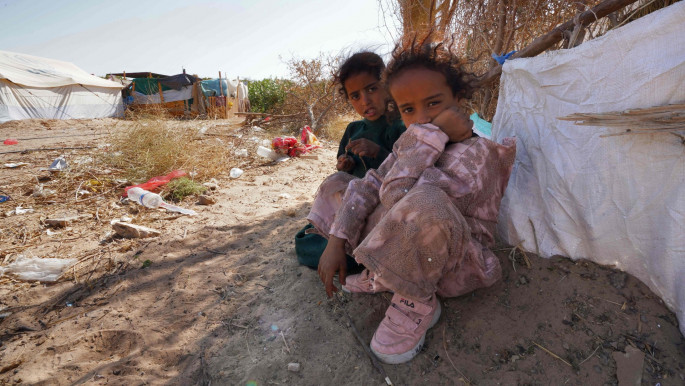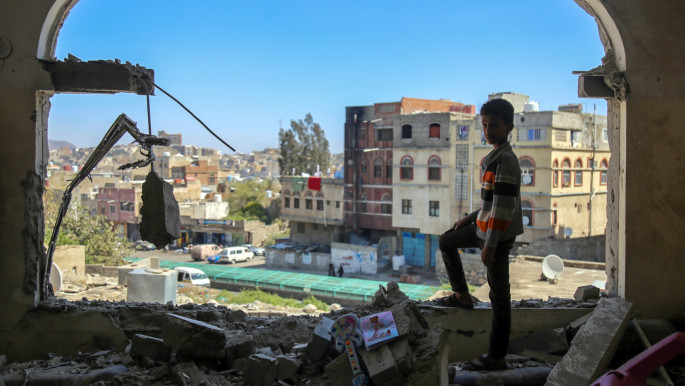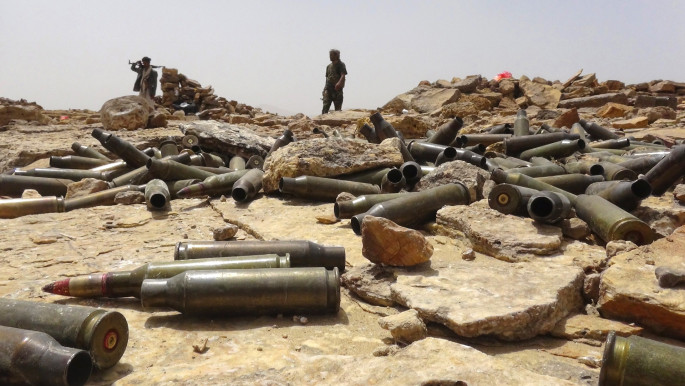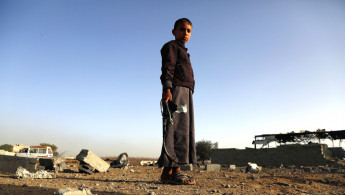Can European arms companies be held liable for war crimes in Yemen?
The first and third struck the home of a father, his pregnant wife and their four children, killing them all as they lay sleeping. Relatives found their bodies in surrounding trees, expelled by the force of the explosion.
Their deaths are both devastating and common. Since international actors entered the Yemen war in March 2015, an estimated 12,600 civilians have been killed in targeted attacks; at least 8,759 have died in airstrikes by the Saudi-led coalition, according to the Yemen Data Project.
The UN, civil society and media have amassed an ever-growing body of evidence of serious breaches of international human rights and humanitarian law committed by all parties to the conflict.
But the strike was rare in one sense. Remnants of the bombs were found at the scene and, on a suspension lug, a serial number revealed their origin: a factory on the Italian island of Sardinia operated by RWM Italia, a subsidiary of German arms manufacturer Rheinmetall.
Just as unusual was the paper trail accompanying the fragments. In an industry notorious for its opacity, the MK80 series bombs could be traced to one of several licenses issued to RWM for export to Saudi Arabia after the conflict had begun, and, importantly, after grave abuses by coalition forces had been widely reported.
 |
The case raises a question rarely tested in courts: can arms companies be liable for crimes committed in war, regardless of whether they received state export authorisation? |  |
If confirmed by a court, the transfer would violate both domestic and international laws which bar arms sales where there is known risk they could be used to facilitate war crimes.
Armed with this evidence, in April 2018, NGOs - the European Center for Constitutional and Human Rights (ECCHR), Rete Italiana Pace e Disarmo and Mwatana - filed a criminal complaint with the public prosecutor in Rome calling for investigations into alleged abuses of power by Italian licensing authorities and complicity in murder by both authorities and RWM managers.
The case raises a question rarely tested in courts: can arms companies be liable for crimes committed in war, regardless of whether they received state export authorisation?
 |
|
| Read more: How the UK became an accomplice in Yemen's famine |
Following an initial dismissal by the prosecutor in 2019, last month a judge ordered the investigation to continue, expanding its scope to include an examination of all licensing decisions since March 2015. Although only the beginning, the ruling is significant.
"Today's decision is really an important signal for accountability and justice," said Cannelle Lavite, a legal advisor at ECCHR. "[It] confirms that the obligation to guarantee the respect for human rights lies with states, but that companies also bare their own responsibility and can be criminally liable when their exports may contribute to grave crimes."
Attempts to prosecute corporate actors for crimes during war can be traced back to the Nuremburg trials, in which several major industrialists, including suppliers of poisonous gas to the Nazi regime, were tried for war crimes.
Since then, several cases have wound through international and domestic courts, including convictions of Dutch arms dealers for smuggling weapons into Liberia in the 2000s, and for furnishing Saddam Hussein's regime with the building blocks of mustard gas.
Prosecution is complicated by an evolving debate surrounding the nature of "intent" required to establish complicity. Under a restrictive interpretation of international criminal law and some national legislations, the accused not only must knowingly contribute to the commission of a crime, but also intend for that crime to occur.
 |
The complex system of production, which sees parts and stages of assembly split between numerous companies in various countries, makes conducting due diligence - and demanding accountability when it fails - especially difficult |  |
"That is obviously a requirement that is not adapted to the reality of how business actors contribute to crimes," said Lavite, who is also involved in a case against cement giant Lafarge for activities in Syria.
Drawing on legal precedent, ECCHR and others argue that knowledge of the crime and consciousness that one's actions are contributing to it are sufficient intent. Moreover, while most cases have focused on individual businesspersons violating arms embargos, experts argue executives of multinational corporations should not be immune to liability just because their deals have state approval.
Arms companies are subject to state export control systems, which, at least theoretically, consider potential human rights impacts. States in turn must adhere to international and regional obligations, including the 2014 Arms Trade Treaty. The treaty - signed by all major exporters except the US and Russia - prohibits exports where there is an overriding risk they could be used to commit serious violations of international human rights or humanitarian law.
Italian law goes even further, prohibiting exports to any country engaged in active conflict. Despite states routinely subverting these principles, advocates say companies hide behind the protections offered by licenses.
Global standards on business and human rights oblige companies to conduct due diligence to identify, prevent and address the human rights impacts of their products and services. "Just because they can export, doesn't mean they are released from their responsibilities," explained Lavite, "it doesn't mean they must export."
 |
|
| Read more: How the odds were stacked against Yemen's Arab Spring revolution |
A 2019 report by Amnesty International found that major arms exporters did not conduct adequate due diligence, instead restricting their reviews to supply chain issues and internal labour practices. Even in France where a 2017 law mandates corporate due diligence, compliance has been superficial.
"The plans companies have presented…don't actually mention anything about the one area of their business which is extremely high risk: i.e. transferring weapons into conflict zones and into countries experiencing political upheaval," said Patrick Wilcken, an arms control specialist with Amnesty.
The complex system of production, which sees parts and stages of assembly split between numerous companies in various countries, makes conducting due diligence - and demanding accountability when it fails - especially difficult.
Moreover, the tendency to view arms transfers as a matter of foreign policy means information on how decisions are made and agreement specifics are often hidden from the public, parliaments, and in some cases, even from judges.
"No one really knows in detail about the licenses or, on the corporate side, the terms of the contracts that have been signed," explained Wilcken. This not only blocks oversight, but stymies efforts to build legal cases, effectively buffering officials against legal accountability.
Gathering evidence following attacks presents its own challenges. Mwatana, an independent Yemeni organisation, has been investigating violations of international law in the country since the Houthis first captured Sana'a in 2014. As the conflict escalated, so did their work.
 |
The RWM Italia case fits into a broader European movement to end arms exports to Saudi Arabia and the UAE and investigate corporate crimes in Yemen |  |
Today, researchers stationed across the country have documented thousands of abuses committed by all warring parties, including targeting of civilians, arbitrary detention and enforced disappearance, torture, sexual violence, and the recruitment of children.
More than 530 of Mwatana's investigations have involved coalition airstrikes, responsible for at least 3,779 civilian deaths. Other organisations like Amnesty International, Human Rights Watch and UN bodies have documented more.
"For a long time, there was no mention of accountability when talking about Yemen," said Bonyan Gamal, of the Sana'a-based NGO.
Pursuing arms companies became one way they could fight for justice, even if not against the direct perpetrators of the attacks. To meet the high threshold of criminal law, they must find clear evidence a particular company's products were used in a specific crime, not an easy task in the Yemen context.
 |
|
| Read more: Why the battle for Marib could determine Yemen's future |
"It's very, very rare that we find remnants," said Gamal. Often local residents or authorities remove the fragments before investigators arrive, and blasts can be so huge that pieces are widely scattered. Those that are found, often cannot be identified.
The RWM Italia case fits into a broader European movement to end arms exports to Saudi Arabia and the UAE and investigate corporate crimes in Yemen.
In December 2019, organisations in the UK, Germany, Italy, Spain and Yemen submitted a communication to the International Criminal Court calling for an investigation into complicity of European arms exporters in the commission of alleged war crimes.
Their communication documents 26 airstrikes on residential areas, schools and hospitals in which there is evidence European fighter jets and other equipment were used. An update from the ICC is expected this year.
Administrative actions invalidated export licenses in Belgium, and challenges continue in the UK, France and Spain. In January, Italy revoked existing licenses for missiles and aerial bombs to Saudi Arabia and the UAE, in what has been hailed a "historic decision".
It joins the ranks of other European countries that have suspended or restricted sales, including Germany, the Netherlands, Norway, Greece, Austria, Denmark, Finland and Sweden.
"Every success in one country can lead to success in another one," said Francesco Vignarca of Rete Pace e Disarmo, which spent years galvanising support around the Italian ban. He is hopeful US President Biden's pledge to suspend offensive support for the war could inspire greater action at domestic and international levels.
This month marks six years of war in Yemen, and four since it assumed the unenviable moniker of the 'world's worst humanitarian crisis'. Amidst a climate of impunity, the Italian investigation into the Deir Al-Haraji airstrike invigorates the fight for justice.
"We welcome this step with great hope," said Gamal of the decision to continue investigations. "It also means a lot for the families that have been affected by the violations during these six years. It means there are legal criminal procedures they can go through and there is some hope for justice, in any way."
Tara Brian is a freelance journalist. She previously worked as a researcher with the United Nations' migration agency. Follow her on Twitter: @trbrian11


![President Pezeshkian has denounced Israel's attacks on Lebanon [Getty]](/sites/default/files/styles/image_684x385/public/2173482924.jpeg?h=a5f2f23a&itok=q3evVtko)



 Follow the Middle East's top stories in English at The New Arab on Google News
Follow the Middle East's top stories in English at The New Arab on Google News


